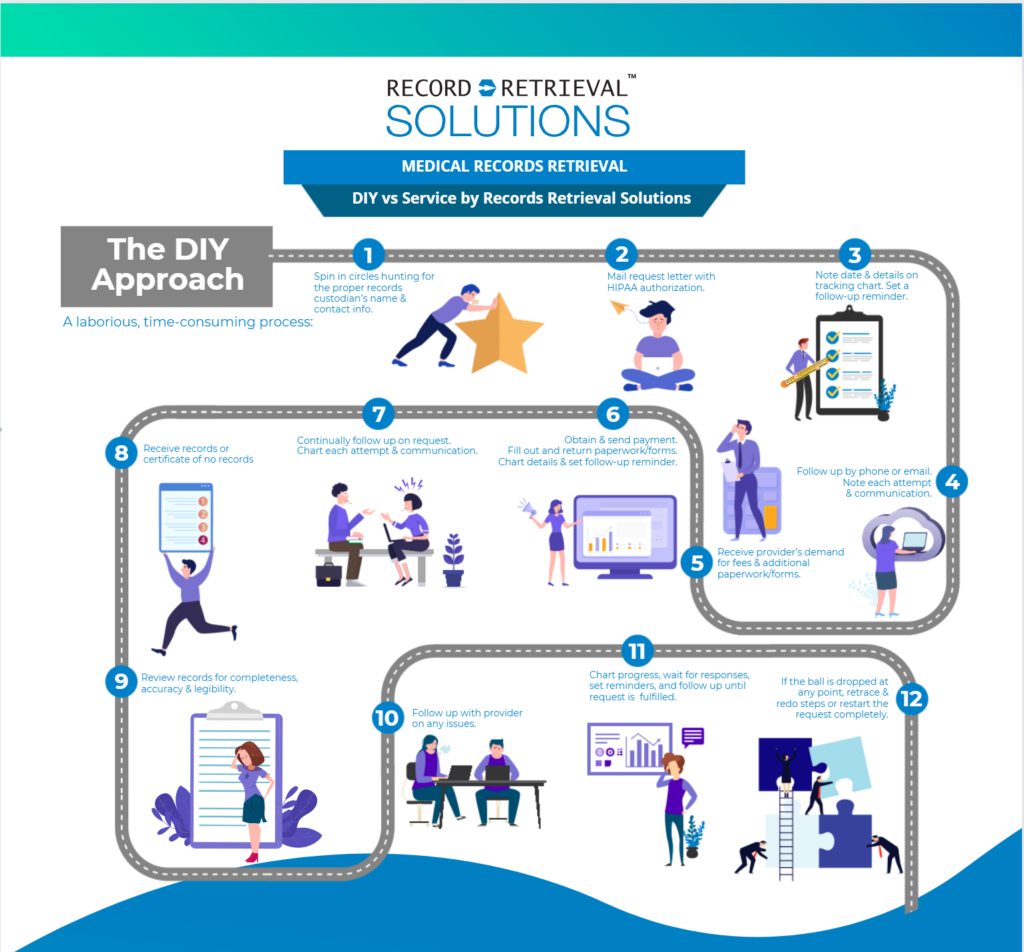Understanding the Challenges of Evidence Gathering
At Record Retrieval Solutions (RRS), we deeply understand the challenges that legal professionals face in evidence gathering—a critical yet complex component of the legal process. The task demands not only meticulous attention to detail but also an adherence to stringent standards of accuracy, security, and timeliness. Whether it’s navigating the vast digital landscapes for electronic evidence or ensuring the integrity of physical documents, the hurdles are significant. From the potential degradation or tampering of evidence to the obstacles posed by cross-jurisdictional laws and privacy regulations, each step in evidence gathering presents its own set of challenges. Recognizing these difficulties, RRS is dedicated to providing solutions that streamline the retrieval process, ensuring that evidence is gathered efficiently, securely, and in compliance with all applicable laws. Our commitment to overcoming these hurdles underscores our role as a trusted partner for legal professionals, enabling them to focus on their core mission: advocating for their clients.
Lack of Access to Relevant Information
Legal professionals often encounter significant obstacles when trying to access all the relevant evidence and information necessary for building their cases. This lack of access can stem from various sources, including strict confidentiality laws, proprietary restrictions, or the deliberate withholding of information by opposing parties. Such challenges are not only frustrating but can critically undermine the fairness and effectiveness of the legal process. Without comprehensive access to pertinent data, lawyers may find themselves unable to construct a robust argument or to adequately challenge the evidence presented by the opposition. This can lead to a weakened legal strategy and potentially affect the outcome of trials, affecting the ability of the justice system to deliver fair and accurate verdicts.
Moreover, the digital era has introduced additional complexities to the issue of information access. While electronic data can offer a wealth of relevant information, legal professionals must navigate an intricate web of digital privacy laws and cybersecurity concerns. Even when information is technically accessible, the process of obtaining it legally and ethically can be dauntingly complex and time-consuming. The challenge is compounded by rapidly evolving technology that outpaces legal standards, leaving gaps in the framework governing access to digital information. Consequently, legal professionals must continually update their knowledge and strategies to effectively manage these hurdles, ensuring they can secure the necessary evidence to support their case and uphold the principles of justice.
Privacy and Data Protection Concerns
The handling of sensitive data and personal information is fraught with concerns surrounding privacy and the stringent regulations designed to protect it. As our world becomes increasingly digitized, vast amounts of personal data are collected, stored, and processed daily by organizations across various sectors. This data, while invaluable for business insights, personalized services, and legal investigations, also poses significant risks if mishandled. Privacy and data protection laws such as the General Data Protection Regulation (GDPR) in the European Union and the California Consumer Privacy Act (CCPA) in the United States have been enacted to address these risks. These regulations mandate strict guidelines on data collection, storage, processing, and sharing, ensuring that individuals’ privacy rights are respected and protected. Legal professionals, therefore, face the dual challenge of leveraging this data for legitimate purposes while meticulously adhering to a complex and ever-evolving regulatory landscape to safeguard privacy rights.

For legal professionals, navigating these regulations is not just about compliance but also about upholding the trust and confidentiality integral to their roles. Whether dealing with client information, sensitive case details, or evidence for litigation, they must ensure that all data handling practices are both legally compliant and ethically sound. This involves implementing robust data protection measures, conducting regular privacy impact assessments, and staying abreast of legal precedents and changes in privacy legislation. Failure to comply can result in severe legal repercussions, including hefty fines, damage to reputation, and loss of client trust. Moreover, as the public becomes increasingly aware of their privacy rights, there is a heightened expectation for transparency and accountability in how personal information is used. Thus, legal professionals must tread carefully, balancing the need for information against the imperative to protect individual privacy, a task that requires both legal acumen and a commitment to ethical principles.
Chain of Custody Issues
Maintaining the integrity of evidence and establishing a clear chain of custody is crucial in the legal process, yet it presents significant challenges. The chain of custody refers to the chronological documentation or paper trail that records the sequence of custody, control, transfer, analysis, and disposition of physical or electronic evidence. It is essential for ensuring that evidence has not been altered, tampered with, or otherwise mishandled from the time it is collected until it is presented in court. Any break or inconsistency in this chain can severely undermine the credibility of the evidence, potentially leading to it being deemed inadmissible in court. This not only complicates the legal proceedings but can also impede the delivery of justice. As such, meticulous attention to detail, rigorous documentation, and strict adherence to protocols are imperative to prevent any breaches in the chain of custody and uphold the integrity of the legal process.
Digital Evidence Complexity

The ascent of digital evidence in legal contexts has introduced a new layer of complexity in the preservation, collection, and analysis of electronic data. Unlike traditional physical evidence, digital evidence encompasses a broad range of forms, including emails, text messages, social media posts, and the contents of electronic devices such as smartphones and computers. This variety not only expands the scope of what can be considered evidence but also introduces challenges in ensuring its integrity and admissibility in court. Digital data can be easily altered, deleted, or encrypted, making its preservation and collection a meticulous process that requires technical expertise. Moreover, the ephemeral nature of digital communications and the rapid evolution of technology necessitate constant updates to digital forensic methodologies to capture and analyze this data effectively. Legal professionals face the daunting task of staying abreast of these technological advances to ensure that digital evidence is handled correctly, from the point of collection through to its presentation in court.
To navigate these complexities, legal professionals increasingly need specialized skills and tools that go beyond the traditional legal training. The field of digital forensics has emerged to meet this need, offering methodologies for the secure collection, preservation, examination, and analysis of digital evidence. Legal practitioners must either acquire these specialized skills themselves or work closely with digital forensic experts to ensure that digital evidence is managed effectively. This includes understanding the legal implications of digital evidence, such as privacy concerns and the applicability of laws across different jurisdictions, especially when dealing with data stored in the cloud or on servers located in different countries. As digital evidence becomes more prevalent in legal proceedings, the ability to competently handle this type of evidence has become a critical facet of legal practice, requiring ongoing education and the adoption of sophisticated technological tools.
Cross-Border Evidence Challenges

Cases that span multiple jurisdictions or involve international elements introduce significant challenges in obtaining evidence across borders. This complexity arises from the differing legal systems, procedures, and standards for evidence collection and preservation across countries. For instance, what constitutes permissible evidence in one country may not be recognized in another, and the process for requesting evidence can vary greatly, involving complex mutual legal assistance treaties (MLATs) or letters rogatory. These legal instruments are designed to facilitate cooperation between countries in the collection of evidence for criminal investigations and prosecutions, but they can be time-consuming and fraught with bureaucratic hurdles. Moreover, issues of sovereignty and national security concerns can further complicate cross-border evidence collection, leading to delays or outright refusal in some cases. The digital realm exacerbates these challenges, as data stored on servers located in a different country necessitates navigating not only the legal landscape but also the policies of international corporations and privacy laws like the GDPR in Europe.
Legal professionals working on such cases must have a deep understanding of international law and the specific legal frameworks of the countries involved. They often need to work in collaboration with local authorities and legal experts within those jurisdictions to effectively gather evidence. This requires not only legal expertise but also strong diplomatic and negotiation skills to navigate the sensitivities and complexities of international cooperation. The ability to communicate effectively across cultures and legal traditions is paramount. Furthermore, staying current with evolving international laws and treaties related to evidence collection is critical, as is understanding the technological and privacy considerations that impact the gathering of digital evidence across borders. The challenges are significant, but with careful planning, collaboration, and adherence to international legal standards, legal professionals can navigate these hurdles to gather the necessary evidence for their cases.
Benefits of Using Record Retrieval Solutions for Evidence Gathering
Experience
With 30 years of experience in the record retrieval field, RRS has established itself as a cornerstone of efficiency and reliability for legal professionals and organizations in need of precise documentation and evidence. Over three decades, RRS has honed its expertise, developing a deep understanding of the complexities and nuances of record retrieval across a myriad of sectors, including medical, financial, and legal. This extensive experience has enabled RRS to refine its processes, technologies, and customer service approaches to meet the evolving demands of the industry. Clients benefit from RRS’s seasoned perspective, which translates into faster, more accurate, and secure retrieval of necessary records, reducing the turnaround time on cases and enhancing overall legal strategies. The company’s long-standing presence in the record retrieval field is not just a testament to its durability but also to its commitment to excellence, innovation, and unwavering support for its clients’ success.
Efficiency
RRS can play a pivotal role in streamlining your process of evidence collection, dramatically enhancing efficiency in legal and investigative endeavors. By offering a centralized and automated approach to the retrieval of records and evidence, RRS minimizes the manual effort and significantly cuts down the time traditionally required for gathering pertinent documents and data. This efficiency boost is not just a matter of speed; it also ensures a higher degree of accuracy and reliability in the evidence collection process, as it reduces the potential for human error and the associated risks of evidence tampering or loss. With RRS, legal professionals and investigators can access a vast array of records—from medical documents to financial statements—swiftly and securely, enabling a more focused and effective strategy in building their cases. This transformation in evidence collection underscores the increasing importance of technology in modern legal practices, offering a clear advantage in the pursuit of justice.

Accuracy
RRS places a paramount emphasis on accuracy, ensuring that the evidence it collects is both accurate and up-to-date, thereby significantly minimizing errors and inconsistencies in the evidence collection process. This focus on accuracy is fundamental to RRS’s operations, as it understands the critical role that precise and reliable evidence plays in legal proceedings. By implementing state-of-the-art technologies and rigorous quality control measures, RRS is able to guarantee the integrity of the records it retrieves. This commitment to accuracy not only supports the legal process by providing clear and incontrovertible evidence but also enhances the efficiency and effectiveness of legal strategies. For clients, RRS’s dedication to maintaining the highest standards of accuracy means they can trust in the reliability of the evidence collected, enabling them to build stronger cases and achieve more favorable outcomes in their legal endeavors.
Speed
RRS sets the industry benchmark for speed in the record retrieval sector, boasting an impressive average turnaround time of just 16 days. This swift pace of operation underscores RRS’s commitment to efficiency and its understanding of the time-sensitive nature of legal and investigative processes. By streamlining its retrieval procedures and utilizing advanced technology, RRS is able to expedite the collection of records without compromising accuracy or security. This rapid turnaround is particularly beneficial in legal contexts, where every day can be crucial to the progression and outcome of a case. RRS’s ability to quickly gather records means that clients can proceed with their legal strategies and decision-making processes more promptly, giving them a competitive edge. In an industry where time is often of the essence, RRS’s speed in gathering records is a critical asset to its clients, enabling more timely resolutions and enhancing the overall effectiveness of legal proceedings.
Security
RRS prioritizes the security of the records we handle, ensuring the highest level of protection for sensitive information. The cornerstone of its security measures is the delivery of records through a HIPAA-compliant online portal. This approach not only aligns with stringent federal regulations regarding the handling of health information but also reinforces RRS’s dedication to safeguarding client data against unauthorized access and breaches. By employing robust encryption and secure access protocols, RRS guarantees that the records are accessible only to authorized individuals, thus maintaining the integrity and confidentiality of the information. This secure delivery method is a testament to RRS’s commitment to combining efficiency with uncompromised security, providing clients with peace of mind that their sensitive data is handled with the utmost care. In an era where data breaches are a significant concern, RRS’s adherence to HIPAA compliance and its proactive security measures exemplify its role as a trusted and secure record retrieval partner.
Reliability
The reliability of RRS is unparalleled, largely due to the fact that the entire process, from request to delivery, is meticulously handled by the dedicated RRS team. This comprehensive management approach ensures consistency, accuracy, and timeliness at every stage of the record retrieval process. By keeping all operations in-house, RRS maintains direct control over the quality and efficiency of the service provided, effectively minimizing the potential for errors and delays. The team’s expertise and commitment to excellence are reflected in the seamless execution of each request, embodying RRS’s promise of reliability to its clients. This end-to-end handling by the RRS team not only streamlines the retrieval process but also fosters a sense of trust and dependability among clients, knowing that their critical record retrieval needs are in capable hands. In an industry where the stakes are high and reliability is non-negotiable, RRS stands out as a beacon of trustworthiness and competence.
Transparency
RRS champions transparency in its operations, offering clients the ability to log in at any time to check the status of their requests. This feature is a testament to RRS’s commitment to open communication and accountability, ensuring that clients are never in the dark about the progress of their record retrieval process. By providing real-time access to the status of requests, RRS empowers clients with the information they need to plan their next steps and make informed decisions. This level of transparency is crucial in building and maintaining trust, as it demonstrates RRS’s dedication to not just meeting but exceeding client expectations. The ability to monitor request statuses at any time reflects a modern, client-centered approach to service delivery, where convenience, accessibility, and transparency are paramount. In doing so, RRS sets itself apart as a record retrieval service that truly understands and addresses the needs of its clients.
In conclusion, Record Retrieval Solutions offers an unparalleled advantage in the evidence gathering process, addressing common challenges with efficiency, accuracy, speed, security, reliability, and transparency. By leveraging RRS’ expertise, legal professionals can significantly reduce the time and effort traditionally associated with record retrieval, while ensuring the integrity and confidentiality of sensitive information through a HIPAA-compliant online portal. The ability to check the status of requests in real-time further enhances the client experience, offering peace of mind and facilitating better case management. With an impressive average turnaround time of just 16 days and the entire process handled meticulously by the RRS team, clients are empowered to focus more on their core legal strategies rather than the nuances of record retrieval. As evidenced by RRS’ three decades of dedicated service in the field, their comprehensive approach not only speeds up the evidence gathering process but also reinforces the foundational pillars of trust and effectiveness in legal proceedings.







